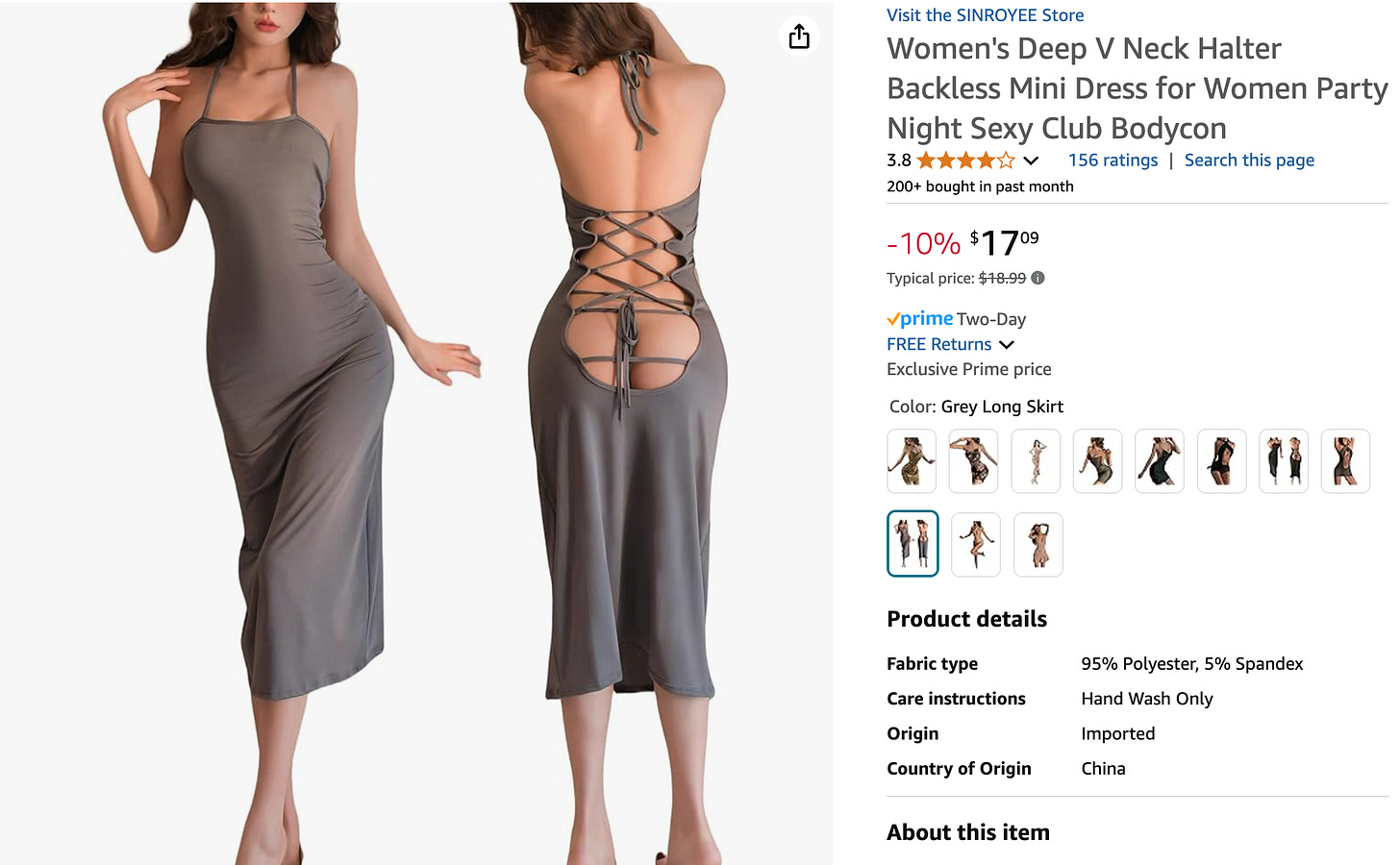Clarification 12/2 - Some commenters thought I argued that women are not oppressed in Iran at all. I did not say that. Women and men do not have equal rights in Iran; that is not what this piece is about. This piece is specifically about the hijab law.
Sam Harris on Islam:
Here’s one clue on the path back to sanity on this issue, which you may have missed: The hijab is not a symbol of female empowerment. Most of the women throughout the world who wear the veil are forced to, by men who will beat the shit out of them if they don’t.
Women can vote in Iran. Did you know that? They can also run for office. Women outnumber men on Iran’s university campuses.
In Iran women are required to wear the hijab. It is considered indecent for a woman to be out in public without her hair covering. America also has public decency laws. If I walked around downtown DC in a speedo I could be arrested.
Women are arrested in America for exposing their breasts in public. In other words, women in America are forced to wear tops, by men who will physically arrest them and put them in jail if they don’t.
Public Decency Laws
Every society has some form of dress code which is enforced through law, and all laws are enforced through violence.
You might say that hijab laws are unfair because women have to wear hijabs and men don’t. But the modern West also has different public decency standards for men and women. Women are generally not allowed to be completely topless while jogging or at the gym, while men are allowed to be completely topless while jogging or at the gym. Very few people think that this difference in dress code for men and women is oppressive. Even if you’re a prude like me and you think it’s tacky for anyone to be shirtless in public, you probably agree that it’s a lot more inappropriate for a woman than a man.
In some parts of Africa, it was acceptable for women to expose their breasts but not acceptable for women to expose their thighs. This is the reverse of the norm in America.
However, the breast/thigh thing is an exception. In general, there is a single sliding scale of public decency standards and different societies are at different points on that scale.
The sliding scale of public decency standards:
Nudism
Loin cloths
Loin cloths plus covering buttocks
Women’s thighs covered, women’s breasts exposed. OR Women’s breasts covered, women’s thighs exposed.
Women and men cover thighs and torsos.
Ankle to neck covering, no hair covering
Hair covering (Hijab / Wimple)
Face covering (Niqab / Burqa)
I think that point 0, nudism, is too extreme. While there are “nudist colonies” which enforce nudity as a social norm, they are a new thing. Every traditional society has at least some form of mandatory covering, even if it’s just a loincloth. This indicates to me that there is something very deep in human nature which leads people to modesty.
I also think that point 7, face coverings like Niqabs and Burqas, is too extreme. Seeing someone’s face is a huge part of human interaction.
I think that point 4 is best, but it’s a matter of opinion. There are societies at points 1 through 6 and I don’t think we should chastise those societies. It is not a moral outrage that the Yamnaya people of the Amazon rainforest have a dress code under which people wear loincloths. Their dress code is more lenient than ours, and we might think it’s less than ideal, but it’s not a moral outrage. It is not a moral outrage that Iran has a dress code under which women wear hijabs. Their dress code is more strict than ours, and we might think it’s less than ideal, but it’s not a moral outrage.
Ahoo Daryaei
In November of 2024, an Iranian doctoral student named Ahoo Daryaei was confronted by the police for improperly wearing her hijab. She ran away from the police and “protested” by stripping down to her underwear and walking around the campus. She was then arrested by the police.
Daryaei immediately became a cause célèbre among the Western media. They made fan art of her and dubbed her a “symbol of resistance.” Resistance to what exactly? Resistance to public decency laws apparently.
I don’t sympathize with Ahoo Daryaei and I think it’s a good thing that she was arrested. You do not have a natural right to walk around in your underwear in public.
Daryaei’s protest - and the international feminist response to it - also make clear that the issue is not really about the hijab. If Iranian feminists were opposed just to the hijab, maybe they would take off just their hijabs. The fact that this woman’s decision to prance around in her underwear was seen as a feminist “protest” shows that feminists aren’t just against the hijab, they’re against public decency standards in general.
Iran’s Hijab Laws
But regardless of whether it’s acceptable for a society to have public decency laws, doesn’t Iran carry out brutal punishments against women who break those laws?
The official punishments for violations of the hijab law are small fines, community service and mandatory counseling for first time offenders, which to me sounds like exactly the kind of enforcement we should have for public decency laws. Iran imposes short prison sentences for repeat offenders.
The community service can include “providing cleaning services at governmental buildings” which hysterical Western NGOs say is a “degrading punishment.”
What about off-the-books punishment? There have been reports of women in Iran being attacked with acid for not wearing the hijab. Do Iranian authorities look the other way as vigilantes mete out severe punishments on women who break the dress code? I don’t know. And neither do you.
In past incidents the Iranian government has prosecuted men who committed acid attacks. In 2019, the Iranian Parliament passed a law to increase the penalty for acid attacks. There’s really no evidence that the government is winking and nodding about the issue.
We should also consider the source. The journalists who tell us that Iran is secretly brutally punishing women for protesting are the same people who spread the lie that American police go around killing black people for no reason.
Conclusion
Countries which require women to wear hijabs in public are vilified in the Western press, but there’s nothing inherently oppressive about a hijab law. Different countries have different public decency standards and that’s ok. Iran’s laws are more strict than I would prefer, but America’s standards of public decency are frankly not strict enough. Instead of complaining about the hijab, we should focus on more important criticisms of Islam, such as the fact that it condones conquest and mandates the death penalty for apostasy.







I'm a 42 years old woman who was born and raised in Iran and am actively trying to escape this hell like country. I should say you and many other people who talk about iran have no idea what is the real life in my society.No, i don't want to be offensive or anything but many of your assumptions about my country is completely wrong.
First: voting in iran is actually a theater and there's no such thing as democracy.Any truly educated person knows that.
Second: many of young women in Iran go to university because they have no other options, not because they love to go to university and majority of these women go to a private(in name only) university that is completely controlled by government.
Third: so many many women are killed every single year by their fathers and husbands and brothers. Just because they don't want have strict hijab or want to have a boyfriend and majority of them are not punished especially the fathers.because in Islam children are father's property and he can kill his child and will not punished.
Unfortunately my english language is not as good as i want it to be to write more about my country.
I hope you don't think that i'm a rude person but please if you want to write about immodesty in your society you don't need to praise a country like mine or a brutal and dictator government like Islamic republic.
Hi Simon. I'm unfamiliar with your work or your persona generally, but was this entirely serious? Iran is one of my interests, and this was so misinformed that I'm tempted to write a whole piece about it. I think it's important to show why this extreme form of conservatism is wrong, but if you're already showing that through next-level trolling, then disregard.